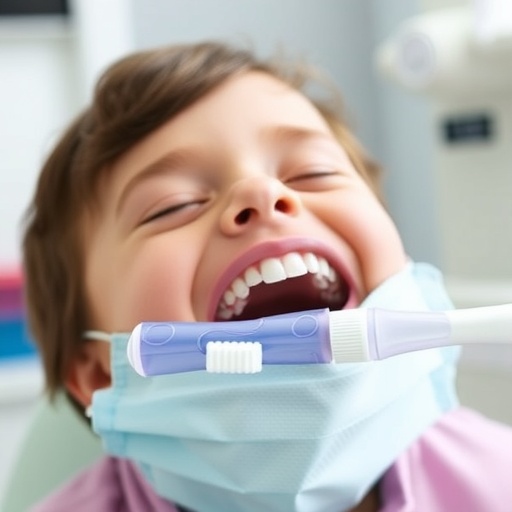
In a groundbreaking advancement for pediatric dental health, a recent clinical trial has identified that dentifrices containing higher concentrations of arginine may offer superior protection against dental caries in children compared to traditional sodium fluoride formulations. This pivotal study, published in JDR Clinical & Translational Research, highlights the potential of arginine-based toothpaste as a transformative agent in the ongoing global battle against childhood tooth decay, which remains one of the most pervasive and costly oral health issues worldwide.
Dental caries, commonly known as tooth decay, continues to represent a significant challenge across diverse populations, particularly affecting children who are in critical stages of oral development. Despite the established efficacy of fluoride in caries prevention — a role substantiated through decades of research and public health initiatives — the dental research community has sought more comprehensive and innovative strategies to enhance and diversify anticaries modalities. This study, spearheaded by Wei Lin and colleagues at Sichuan University, meticulously examines the efficacy of varying concentrations of arginine in dentifrices relative to a conventional sodium fluoride control.
The research design is notable for its rigor and scale. Conducted as a two-year, phase III randomized controlled trial, it involved 6,000 children aged 10 to 14 years with pre-existing active carious lesions. Participants were randomly assigned to use one of three toothpaste formulations: one containing 8.0% arginine, another with 1.5% arginine, and a traditional sodium fluoride dentifrice with 0.32% NaF serving as the positive control. This multi-centered clinical investigation took place across three centers in China from April 2019 to March 2022, implementing a double-blind, parallel-group design to ensure objective assessment and minimize bias.
.adsslot_JcryDlV83E{width:728px !important;height:90px !important;}
@media(max-width:1199px){ .adsslot_JcryDlV83E{width:468px !important;height:60px !important;}
}
@media(max-width:767px){ .adsslot_JcryDlV83E{width:320px !important;height:50px !important;}
}
ADVERTISEMENT
A key metric for evaluating the study’s outcomes was the incremental change in DMFS (decayed, missing, and filled surfaces) and DMFT (decayed, missing, and filled teeth) indices, universally recognized clinical indicators for the extent of dental caries. After two years of consistent usage of assigned toothpaste formulations, the data revealed a statistically significant reduction in caries incidence among children using the 8.0% arginine dentifrice. Specifically, these participants experienced a 26.0% decrease in DMFS and a 25.3% reduction in DMFT indices when compared to those using the sodium fluoride control.
Contrastingly, the 1.5% arginine formulation did not demonstrate a statistically meaningful difference from the sodium fluoride toothpaste, suggesting that concentration plays a critical role in the anticaries efficacy of arginine-containing products. This dose-dependent relationship underscores the necessity to explore optimal arginine concentrations within dentifrices to maximize therapeutic benefit while maintaining safety and tolerability for pediatric use.
The mechanism by which arginine exerts its anticaries effect is linked to its biochemical role as a positively charged amino acid that can modulate oral biofilms. Arginine metabolism by certain oral bacteria results in the production of ammonia, which elevates plaque pH and counteracts the acidic environment responsible for enamel demineralization and subsequent cavity formation. This biological interaction positions arginine not only as a beneficial additive but as a functional ingredient capable of shifting the microbial ecology toward a less cariogenic state.
Given the widespread reliance on fluoride-based products and the emergence of concerns regarding fluoride exposure in specific populations, the prospect of an alternative or adjunctive agent like arginine dentifrice is compelling. Particularly in pediatric dentistry, where early intervention can impact lifelong oral health trajectories, a dentifrice that delivers enhanced protection without increased risk could shape future preventive protocols.
Moreover, this study exemplifies the value of large-scale, multi-center randomized clinical trials in providing robust evidence to support or challenge current clinical practices. The inclusion of a sizable cohort with active carious lesions provides relevant insights applicable to real-world dental care settings, unlike studies focusing solely on caries incidence prevention in healthy populations.
The evolution of dental products incorporating bioactive compounds such as arginine reflects a broader trend in dental materials science toward multifunctional formulations. Future research is anticipated to evaluate the synergy of arginine with other agents, dosage optimization, long-term safety profiles, and its efficacy across different demographic and geographic populations.
In conclusion, the findings from this landmark trial advocate for the integration of high-concentration arginine dentifrices into clinical practice as an effective, evidence-based approach for reducing dental caries in children. This advancement may prompt dental healthcare providers, public health policymakers, and manufacturers to reconsider current formulations and expand preventive strategies beyond fluoride-centric paradigms. Continued investigation and validation within diverse populations will be essential to fully harness the therapeutic potential of arginine in safeguarding pediatric oral health.
Subject of Research: The efficacy of arginine-containing dentifrices in preventing dental caries in children with active caries compared to sodium fluoride toothpaste.
Article Title: Arginine Dentifrices and Childhood Caries Prevention: A Randomized Clinical Trial
Web References: https://journals.sagepub.com/doi/full/10.1177/23800844251361471
Keywords: Arginine, Dental care, Human health, Orthodontics
Tags: arginine toothpaste efficacyarginine-infused dentifricescaries prevention strategieschildhood dental caries preventionclinical trial on dentifricesdental health researchinnovative dental treatmentsoral development in childrenpediatric oral healthsodium fluoride alternativestooth decay in childrentransformative dental care solutions





